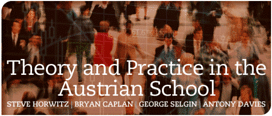I’m delighted by Steve Horwitz’s latest reply, but also confused. Steve initially dismissed doubts about Austrians’ interest in empirics as an unfair stereotype. Now he seems to admit that the stereotype is well-grounded in fact:
Too many Austrians argue as if we must figure out the right methodology (and method) for economics first, then go out and “do” economics. I think that’s the wrong way to conceive of the issue. One reason it’s so wrong is that, as George Selgin points out in his entry, there are multiple Ludwig von Miseses when it comes to pronouncements about these issues. I very much intentionally presented a view that emphasized one of those Miseses, but George is quite right to point to the others. The result is that these debates get bogged down in “what did Mises really mean?” squabbles. I have been guilty of playing this game myself in the past, which distracts us from actually doing good (Austrian) economics. If nothing else, I hope that my original entry can persuade some critics that the anti-empirical reading George identifies as being more the rule than the exception among self-described Austrians is not the only possible Mises.
Perhaps I’m misreading Steve, but this seems like a near-180. Instead of claiming that non-Austrians are woefully ignorant about Austrian economics, he’s now trying to convince non-Austrians that the Austrian economics they typically encounter isn’t the only possible version. I consider this a major advance over Steve’s original position.
At the same time, though, I’m confused. Steve’s original post heavily criticized the Josh Barros of the world for their incomprehension of Austrian economics. Steve’s latest post covertly retracts that criticism. Why didn’t Steve tell Josh, “You’re complaints about Austrians are entirely understandable. You’re right about most of us. But you’ve overlooked a growing number of exceptions”?
The people Steve should be criticizing aren’t mainstream economists who accurately criticize what the typical Austrian says. The people Steve should be criticizing are typical Austrians who make empirically minded Austrians like himself look bad.

